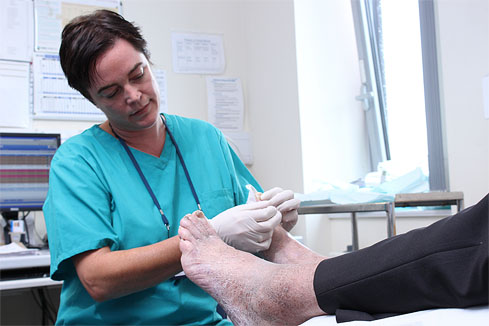
Introduction
Podiatrists are experts in all aspects of the foot and lower limb. Working across all health and care settings, their primary aim is to manage people’s health, mobility, and independence. Podiatrists support people with learning disabilities with foot complications, often resulting from structural, joint, or gait conditions that can result in reduced or restricted mobility.
Salary, hours and benefits
| Average salary | £24,907 – to £44,503 depending on experience |
| Typical hours | Standard hours are usually around 37.5 hours a week |
| You could work | – |
| Benefits |
|
What you’ll do
Your day-to-day duties may include:
- helping people with lower limb pain or problems walking
- helping diabetes sufferers with circulation problems who may be at risk of amputation
- developing a tailored treatment plan for someone with arthritis to keep them mobile and independent
- supporting someone to regain mobility after a period of acute illness
- encouraging someone to adopt healthier lifestyle choices that improve overall health and wellbeing.
Characteristics and skills required
You’ll need:
- to be caring and enjoy working with people
- the ability to calm and reassure people
- communication skills to listen to clients and explain things clearly to them
- the ability to explain treatment to patients
- business skills for private practice
- patience and tact to work with people who are in pain or who feel embarrassed
- a careful, methodical approach to your work
- the ability to plan and organise treatment
- to be precise and accurate when providing treatment
Career path and progression
There is a range of roles within podiatry, from support to leadership:
| Career Framework level | Role | Degree? |
|---|---|---|
| 3 | Podiatry Assistant Podiatry assistants work under the delegation and supervision of a qualified podiatrist (stage 1 of BSc). | No |
| 4 | Advanced Podiatry Assistant Advanced podiatry assistants work under the delegation and supervision of a qualified podiatrist (stage 2 of BSc). | No |
| 5 | Podiatrist Manages own caseload, clinic, and supervises podiatry assistants | Yes |
| 7 | Advanced Podiatrist Engages in peer supervision and leadership of podiatry teams. Provides evidence-informed clinical practice. | Yes |
| 8 | Consultant Podiatrist Head of Podiatry Service, directly supervising advanced practitioners. Operating at MSc level. | Master’s degree |
| 9 | Senior Management and Leadership Podiatric Surgeon Representing a group of professions at Board level. Working towards or qualified as Podiatric Surgeon. Operating at post-doctoral level. | Master’s degree |
How to become a Podiatrist
To become a podiatrist, you will need to have completed a degree in podiatry.
You can get into this job through:
- a university course
- a degree apprenticeship
University
Degree courses take three or four years on a full-time basis, or four-and-a-half years part time.
Entry requirements
You’ll usually need:
- 3 A levels, including a biological science
- five GCSEs (grades A-C), including English language, maths, and science
or alternative qualifications, including:
- BTEC, HND, or HNC that includes science
- relevant NVQ
- science-based access course
- equivalent level Scottish or Irish qualifications
- a previous degree or a full practising qualification in a related area.
Masters programmes (MSc) usually take two years and, like the degree programmes, involve clinical practice and academic study. You’ll usually need a relevant degree to be able to get onto the masters programme.
Apprenticeship
You can do a podiatry degree apprenticeship. This takes four years to complete and combines study with training on the job.
To do this apprenticeship, you’ll need:
- 3 A levels
- BTEC or an equivalent qualification.
From within Health and Social Care
If you are already working in the health and social care sector and you are looking for a new challenge, then you can change career to become a podiatrist within learning disability and autism support and care. To qualify as a podiatrist, you can do a degree (BSc) in podiatry approved by the Health and Care Professions Council (HCPC). Degree courses take three or four years on a full-time basis, or four-and-a-half years part time.
Students who already have a sports science degree (or any other degree) with experience in a healthcare setting may apply for an MSc Podiatry (Pre-registration), which can be done on an accelerated basis.
Students who do not already have a degree but have relevant healthcare experience may be considered for entry to some podiatry undergraduate programmes via the Accreditation of Prior Learning (APL) process, which is considered by some universities including University of Salford.
From outside Health and Social Care
If you want to work in health and social care and you are looking for a new challenge, then you can change career to become a podiatrist within learning disability and autism support and care. To qualify as a podiatrist, you can do a degree (BSc) in podiatry approved by the Health and Care Professions Council (HCPC). Degree courses take three or four years on a full-time basis, or four-and-a-half years part time.
Students who already have a sports science degree (or any other degree) with experience in a healthcare setting may apply for an MSc Podiatry (Pre-registration), which can be done on an accelerated basis.
Students who do not already have a degree but have relevant healthcare experience may be considered for entry to some podiatry undergraduate programmes via the Accreditation of Prior Learning (APL) process, which is considered by some universities including University of Salford.
Financial support
You will be entitled to receive between £6,000 and £8,000 a year towards your studies while at university. Your personal circumstances may mean you could receive more. You’ll never have to pay it back.
Current opportunities
Most NHS trusts advertise their vacancies on NHS Jobs. Some advertise on trust websites. You can find a list of trusts on NHS Choices.